Acoustic Instrument
Primers
What Kind of Guitar
Should I Start On?
What Kind of Banjo
Do I Want?
Evaluating and
Buying Used
Guitars
Setting Up
Fretted Instruments Whatever Happened
to the Banjo?
Beginning Five-
String Banjo
6-String Banjos
Banjo Pickups
Axes in my Life
What is a
Bluegrass Banjo?
Dean "Backwoods
Six" Shootout
Music Theory
Primers
Introduction
to Scales
Introduction
to Chords
Circle of Fifths
Other Articles
About Music
How to Give
Guitar Lessons
Musician or
Wannabe? Did God Really
Give Rock &
Roll to You?
Are You a
"Brand Bigot"?
Historical Links
About the
National Road
The Story Behind
the Story - Real
People, Places,
and Events
About the Play
Play Home
What's New
Overview
About the
Music
About the
History
About the
Logistics
About the
Cast
Synopsis
About the
Set
About the
Author
Contact Us
Home

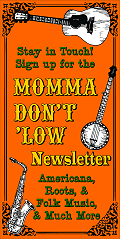
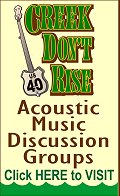

|
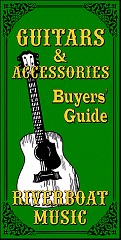
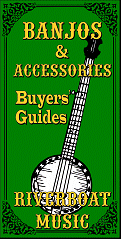
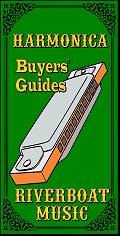
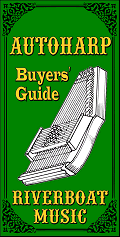
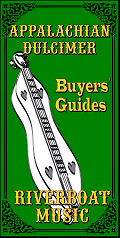
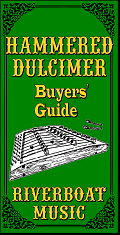
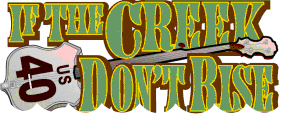 Who Owns Folk Songs?
Who Owns Folk Songs?
| Written by Paul Race for Creek Don't RiseTM and School Of The RockTM |
It's almost never the songbook publisher, even if that company name appears with a copyright notice on the bottom of the page. Just thought I'd start out with that, because it's a common, and often costly mistake. More below . . .
This is going to be as much memoir as article, as just saying what the "rules say" won't give the whole story. In my 52 years as some sort of musician, I've seen abuses on every side of this issue, and I can't help thinking that examples and personal experiences will help shed light on the subject. Also, there is no legal advice in this article. I am simply trying to highlight some issues and define some terminology you're apt to encounter as you practice any kind of music career (or avocation).
By one of the most popular definitions, Folk songs tend to be songs that have come down through the generations, and whose origin nobody knows. Songs like the "Crawdad Song" or "Cripple Creek." That said, many exceptions to this definition are also considered Folk songs by one group or another:
Some of these issues came home to me about 2004, when I was editing (and mostly writing) a Scott-Foresman history book for Mississippi elementary school students. I didn't work for Scott-Foresman; I worked for a Dayton-area subcontractor, Mazer, that has since ceased operations. One standard Scott-Foresman "feature" was to have relevant poems or song lyrics every so many chapters. As a musician, I was always glad to participate in the song selection, but I never talked to the publishers; Scott-Foresman had "experts" for that.
My co-editor and I wanted to close the chapter on Civil Rights with the lyrics to "We Shall Overcome." But Scott-Foresman's "experts" on negotiating publishing rights refused to let us use it because it was too much trouble to figure out ownership. Back in 2004 when you used the internet to try to find the copyright owner for that song (or almost any song), the first several Google pages or so would list songbooks that included the song, each of which had its own copyright date. Within several of those books the copyright for the individual song was left out or buried in end notes, leaving the book publisher or editor as the apparent copyright holder. In fact, when I talked to the "experts" at one point, they were arguing over which branch of Hal Leonard to contact, since so many resources showed Hal Leonard as the copyright holder. I knew Hal Leonard was not the copyright holder and tried to explain that copyrighting a piano arrangement for the song isn't the same as owning the song. "It's too confusing," the paid "experts" whined. "Find another song." As though there IS another song that would serve the same purpose.
Being a Baby Boomer myself, I knew to look past the recent publications whose conflicting copyright dates and owners were so confusing to the Scott-Foresman 20-something "experts." After a few minutes of my own research, I tracked down the company (now part of The Richmand Organization) that actually administers the copyright. I contacted the person listed as the copyright administrator to be certain I had the right folks. Then I called the Scott-Foresman "experts" and gave them the contact information. The outcome was twofold:
What Publisher with Integrity Would Claim Copyright on Obviously Public-Domain Material? - Fast forward to a few years later, when I'm trying to put together a medley of Folk-style hymns for a guitar instrumental that I want to put on a CD.
Since then, I have noticed one particular songbook publisher listed as the "publisher" of public domain songs on many CDs. There is no publisher, really. But due to such deceptive printing practices as I encountered researching "In the Sweet By and By," that publisher is earning a tiny, but undeserved share of each CD printed.
What Artist with Integrity Would Refuse to Give an Author his or her Due? - On the other side, many folks have written songs that subsequently became popular and worked their way through a "community" without the author's name attached, to the point that you find folks refusing to pay royalties to the original author because they don't believe he or she is really the source. In some cases, there are not two, but ten or more conflicting "Registration of Copyright" forms on file with the Library of Congress, and the original author does not have the money for a legal battle.
The most notorious case in Folk circles might have been "Black is the Color of my True Love's Hair," whose best-known tune was written by Folk song collector John Jacob Niles. Because the words were older than Niles' tune, most singers decided to ignore Niles' "half-ownership" of the song and listed it as "Traditional" or some such on their records, saving themselves a tiny bit of royalties and their record companies some paperwork.
What Songwriter with Integrity Would Claim to Have Authored a Public Domain Song? To further complicate things, a number of musicians and collectors (including some who really did write some songs, such as A.P. Carter) would list themselves as the author of songs other folks had written but no one had yet recorded or published. In some cases, as late as the 1960s, the record companies encouraged this. If an artist recorded an old song and didn't list somebody as author, there was always the chance that someone claiming authorship would turn up with a lawsuit. On the other hand, if the artist claimed ownership to a dubious or traditional song, and a lawsuit came up, the artist would bear the brunt of the lawsuit, leaving the record company off the hook.**
American Folk fans were incensed when British Skiffle singer Lonnie Donnegan claimed authorship of "Rock Island Line" in the UK - how dare he? But in those days, some record companies were refusing to release albums with "traditional" instead of an author's name. (Oscar Brand's label once listed him as the author of "The Star Spangled Banner" on an album.) I'm not sure that totally exonerates Lonnie, but that song's sucess opened the UK to hundreds of American-written songs and many tours by American performers.
Technically speaking, a song is in public domain if:
Theoretically, when you copyright a song you wrote, you also have the right to first publication. So if you send in a demo and they like your song but they don't like you, they shouldn't be able to shop your song out to some better singer. Guess what? They'll do it anyway. And if the other person makes money off of it, you'll get your royalties, so don't cry too hard.
How long does copyright last? Well, that's been adjusted several times in my lifetime. If the author is still alive, it's still copyrighted. It used to be that the song's copyright outlived the last surviving author by 70 years with a 75 year maximum. That means that any songs originally copyrighted before 1922 are now in public domain.
Now there is a 95 year maximum, which applies to every song written in 1923 or later. So the next big batch of songs to enter public domain will not start until 2019.
If you're looking at recording or rewriting a song that might not be copyrighted at all, or if you first came across it in a book published in 1964, but you think it may be much older, do your homework. If you can find that, say, that it was first published in 1921, you're off the hook.
This doesn't mean that you should avoid using copyrighted works. Just that you should be aware of which songs still legitimately belong to other people.
Rediscovered or Otherwise Unpublished Works - What if some ancient song went completely out of publication and public consciousness, then was rediscovered? Or some song that had been floating around some obscure locale for a century was suddenly plucked from obscurity and published or recorded for the first time ever? The person doing the publishing or recording could admit that it was "based on traditional materials" and still claim authorship. And since no one would be able to tell which bits were original and which bits were traditional, for all intents and purposes, the self-proclaimed author owns the whole thing.
Back in the 1920s and 1930s, A.P. Carter realized that he would earn just as much money on old mountain songs he collected and claimed ownership of as he would on songs he wrote himself. You could make a case that those songs would have passed into total obscurity without his help, but did that really make him the sole owner of such songs? During the Folk Revival, some artists who wanted to record some of those songs found out their true origins - in some cases, they tracked down other sources that preceded Carter's claim. And they began listing them as "traditional" on their albums. Nobody bothered to argue with them. But what if they had?
A related issue might be folk songs published in collections by people like Alan Lomax or John Jacob Niles. Technically, such collectors could claim ownership of those songs, and some do. But folks who loved folk songs as much as Lomax or Niles seldom demanded royalties on songs they unearthed. For one thing, they were aware that most of the songs they were collecting were related to a larger family of songs, with variations and versions untold. If you have a question about such a song, look to see how it's been treated on other recordings. If a version similar to what you want to record has already been recorded as "traditional," you're probably safe.
Derivative Works - Sometimes artists add their own verses or other bits to songs that were in public domain, and copyright their arrangement as a "derivative work." If the version becomes the one everybody knows, then for all intent and purposes, it might as well be an original work. This was quite popular during the Folk Revival. For example Noel Stookey's (rightfully) copyrighted minor-key version of "This Train Don't Carry No Gamblers" or Hedy West's reworking of the traditional "900 Miles" into the (rightfully) copyrighted "500 Miles." This has happened in Bluesgrass, too - "Tex" Logan,'s "Christmas Time's a Comin'" is a clever rewrite of the public domain "Christmas Time Will Soon Be Over." In such cases, you could still sing or adapt the original song, but if you preferred to record the Stookey or West or Logan version, you would have to repect their contribution, financially and otherwise.
Derivative Works that Assimilate the Original - But sometimes the copyrights to rearranged or expanded traditional materials seem to work their way upstream and get applied to the original materials as well. For example, in 1948, Slim Gaillard and Lee Ricks added verses to the pre-existing children's song "Down by the Station," and claimed a copyright on the whole thing. Tommy Dorsey added even more verses but left Ricks and Gaillard listed as the composers. Today, many recordings that use only the traditional materials, still credit Ricks and Gaillard. It is entirely possible that if you add your own verses (with an original tune) to the traditional chorus, you could be leaving yourself open for a lawsuit by Ricks' and Gaillard's publishing company even if you use none of Ricks, Galliard's or Dorsey's contributions. Would you win such a lawsuit? Almost certainly, since it's not that hard to track down sources of the traditional materials that precede Ricks and Gaillard's copyright. But could you afford it? Is it worth the risk?
Keeping Public Domain Works in the Public Domain - For such reasons, some Folk historians make a point of keeping a copy of everything they come across while it is still public domain - that way if someone claims authorship in the future, there will always be one copy that disproves their claim. Some artists make a point of recording public domain materials for similar reasons.
If you are a recording or performing artist considering a work that might be in the public domain, make certain of its status before you record it, and note that status on the recording, or notes, or metadata properties or whatever auxiliary materials may accompany that recording in the future. If you think a song may be public domain, don't slavishly copy the composer and publisher information that you see for it and set things up to send money to them - you may be subsidizing someone who had nothing to do with the song's origin or even its popularity. And you may be undermining the rights of future musicians to use that song without paying that kind of extortion.
On the other hand, if a song is under copyright, be certain to get the credit and the royalty payments right. It's the moral thing to do, and it might keep you from a lawsuit you wouldn't win.
Frankly, none of my songs are likely to support me in my old age, but that doesn't give me the right to usurp other people's rights or make me inclined to give up my own.
Shelia always told our daughters that if you can't afford to tip, you can't afford to eat out. I feel the same way about using other people's music - if you can't afford the pittance that your recordings should contribute to other musicians, you shouldn't be using their songs.
If you're really on a tight budget, or your project is so underfunded or undermanaged that you really can't make certain that the right people are being compensated, consider using only original and/or public domain stuff. Chances are folks would rather hear originals than "covers" of songs other people have already done better anyway.
As far as performing other people's material "out" goes, you're safe doing that most places that regularly host live music, especially cover bands. Such venues are already paying blanket ASCAP, BMI, and SESAC royalties every month. Most likely, any material you "cover" that was written by anybody with "clout" is already included in such payments. Singing "You've Got a Friend" to close your second set is totally legit. Putting it on a CD without paying royalties is not. On the other hand, venues that typically don't have live music may request you to do all originals or public domain sings. For example, a sports bar that doesn't usually have live music may be paying to license the sports channels they show on their wide-screen televisions, but NOT paying ASCAP, BMI, and SESAC.
What about uploading performances of copyrighted material on You-Tube? Technically, it's illegal, but some publishers (and some artists) seem to think it's no big deal, especially if you're no threat to the original artist. Others will put up a "cease and desist" order that will not only get the cover taken down, but will also get anything else you've ever posted to YouTube taken down at the same time.
Nowadays, there are algorithms to discover any copyrighted songs that are posted on YouTube. For a time, music publishers used those algorithms to nail the people who uploaded them. But more recently, many publishers have begun to allow them to stay posted, because YouTube could put advertising on the front end of the really popular uploads, and the music company would earn money that way. In fact, one song I thought about covering on YouTube a couple years ago was never allowed to stay online. Every time someone uploaded the original recording OR a home-made cover, the song was taken down immediately, and sometimes the accounts were suspended. But I checked again this week, and the record company has uploaded the song themselves, and is allowing covers to flourish. Hey, that album has been out of "print" for twenty years, so why ignore the income they can get from "monetizing" the song?
If you're not sure how a cover you were thinking about uploading to YouTube would be received, I would recommend looking to see how other folks' performances of that composer's work are treated. If they seem to disappear almost as fast as they appear, you have your answer. But check back again in a few months. Things are changing very fast.
On the other hand, be sure to respect legitimate copyrights And don't feel bad about insisting that other folks respect your rights as well.
Practice often, learn new songs and musical skills constantly, and play out and record when you can.
Best of luck,
Paul Race
*This was a first. Usually I was called on the carpet for making the "art researchers" look bad by tracking down art that they couldn't find "anywhere." ("Seriously, you don't know Leutze's painting of Washington Crossing the Delaware?") Or making the "fact checkers" look bad by finding legitimate sources for information they swore couldn't be verified. To be fair, the graphic arts people I worked with there were the best I've ever known, and I learned a lot from some of the other editors. But overall, I don't really miss the textbook publishing industry. Return to text.
**In some cases, I think the beancounters at the record label would rather pay the wrong person than risk being sued. After all, if it turned out that someone OUGHT to be getting the money and you weren't paying anybody at all, it made you look bad. If you were paying the wrong person, you could call it a mistake and let the real owner go after the person who's been getting the money so far.
When I was consulting from my country home, a similar mindset persisted among the folks in payroll. They always insisted in taking out city tax, even though I didn't live or work in a city. The first time I called to complain about this, they simply started taking out taxes for a different nearby city instead. When I called again, the beancounters said, "You have to pay city taxes somewhere." "No, I don't. I don't live in town." "It's not that much money, Mr. Race. Why don't you let me take it out just to be on the safe side?" "But I don't owe it to anybody." "No, Mr. Race, you don't understand. Everybody pays city tax somewhere." "I don't." You could almost hear their little brains exploding. Whenever I see a songbook publisher getting publishing credit (and therefore royalties) on a century-old song, I credit the same kind of "we have to pay somebody" thinking.
If you owe someone money, pay it. If you don't, keep it. Don't pay it out of habit. For one thing, it encourages companies who are used to claiming ownership of public domain materials for their own profit to keep expanding their efforts. Conversely, every time you record a public domain song and list "traditional" as the author, you are guarding the right of the next generation of musicians to do the same thing. Return to text.
All material, illustrations, and content of this web site is copyrighted ? 2001, 2002, 2003, 2004, 2005, 2006,
Note: Creek Don't Rise (tm) is Paul Race's name for his resources supporting the history and For questions, comments, suggestions, trouble reports, etc. about this play or about this web page, please
contact us.
and John Jacob Niles
.
"), but which are still under copyright (see below).
."
What is Public Domain?
Confused? You're not alone.
What is Copyright?
In a word, ownership. When you write a song, you are the owner of the song from the moment you put anything on paper or into a recording. That said, you may want to "register" your copyright by sending the song and correct forms to the Library of Congress. That way if someone else decides they like it and want to register it for their own, you will have your "registration" in first. If someone else really does claim ownership or records it without paying royalties, you need to have the song registered before you can perform any legal action. Does that mean that every time you write a scrap of song, you need to rush it to the Library of Congress? Probably not. But some folks send a "collection" of songs every so often (it costs the same as sending one song). And if you're sending demos to record companies or the like, you might want to consider registration as a proactive measure.
Can a Song that Was Public Domain Come Under Private Copyright?
If a public domain song is still being widely recorded and played, it will probably remain in public domain forever. "Wabash Cannonball" and the "Wreck of the old 97" are two examples. But little-known or seldom-played songs may be at risk.
Respect Copyrights
At the opposite end of the spectrum from people asserting ownership of public domain materials are folks who think they should be able to play, record, and even rewrite copyrighted materials for free. Songs like "I'll Fly Away" and "City of New Orleans" are so well-known that they are almost national treasures. Yet they are still owned by the heirs of the original composers. In some cases, the royalties trickling in may be the only thing supporting the composers or their widows in their old age or putting their kids through college. But even if you're just making rich people richer, that isn't your call.
Conclusion
Stuff that everybody already has the right to sing or record shouldn't be usurped by folks who automatically print a "boilerplate" copyright statement at the bottom of every page. Or who change two lines and claim ownership of the whole song. Don't contribute to this growing tendency just because it's easier to give the wrong people credit (and sometimes royalties) than to assert your rights to public domain material.
![]()
![]()

![]()
![]()
![]()
![]()
Creek Don't Rise
2007, 2008, 2009, 2010, 2011, 2012, 2013, 2014, 2015, 2016 by Paul D. Race. All rights reserved.
Creek Dont' Rise(tm) is a participant in the Amazon Services LLC Associates Program, an affiliate advertising
program designed to provide a means for sites to earn advertising fees by advertising and linking to Amazon.com.
music of the North American Heartland as well as additional kinds of acoustic and traditional music.
Visit related pages and affiliated sites:
- Music -


















- Trains and Hobbies -






- Christmas Memories and Collectibles -






- Family Activities and Crafts -





